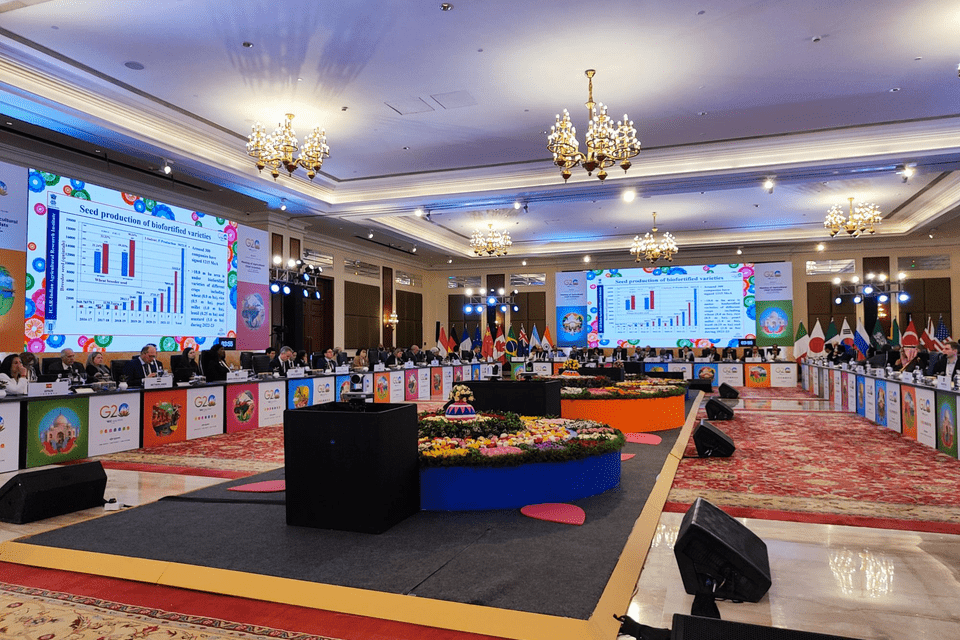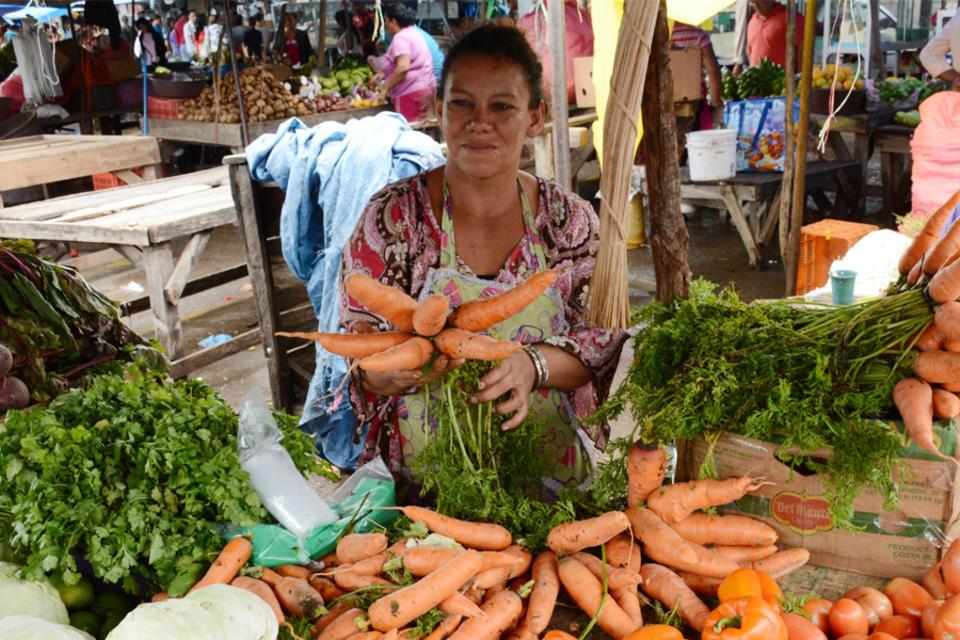Blog Farm resilience and healthy diets for a sustainable food system in Vihiga County, Kenya
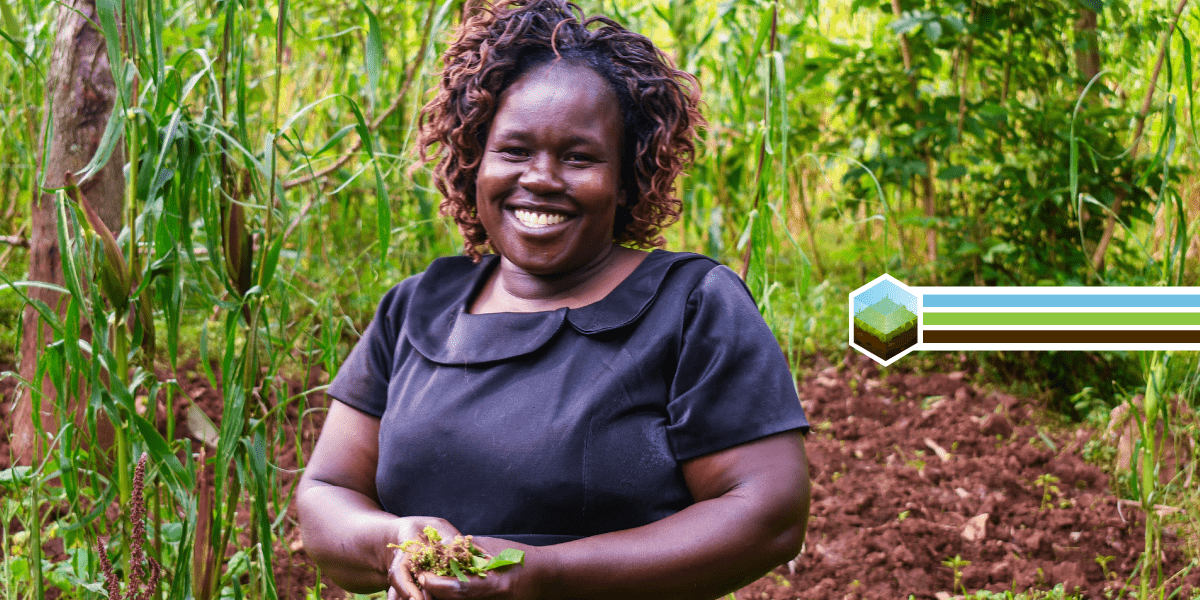
By: Edith Mutui and Lilian Aluso
The Alliance has been implementing various projects in Vihiga County (Kenya) in collaboration with farmer communities, the County Government of Vihiga, local universities, research institutions and local NGOS with funding from Biovision Foundation Switzerland. The aim of the current project, “Diverse seeds and planting materials supporting farm resilience, inclusive value chains and healthy diets in a sustainable Vihiga County food system” is to support healthy diets, farm resilience, climate change adaptation, community empowerment and sustainable livelihoods. The milestones achieved so far would not be possible without the close collaboration with farmer communities, County Government of Vihiga, Seed Savers Network, Rural Outreach Africa, World Agroforestry (ICRAF), Kenya Agricultural and Livestock Research Organization, Masinde Muliro University of Science and technology among the partners .
The names tsimboga (amaranth), lisutsa (African nightshade), likhuvi (cowpea), mitoo (rattle pod/slender leaf), mrere (jute mallow), tsisagaa (spider plant), likanzira (Ethiopian kale), inderema (vine spinach), and liseveve (pumpkin leaves) are very familiar names in the western region of Kenya. As a visitor to the region, one would ask what is in these names.
While Shakespeare may have used this question to reflect on the essence of identity, the names hold much more significance than meets the eye. From cultural traditions to personal connections, these names of traditional leafy vegetables are a powerful representation of what the Vihiga community seed bank farmers have used to transform their livelihoods. The community seedbank (CSB) is managed by the Vihiga Nutrition and Community Seedbank CBO, an umbrella organization comprising of 10 farmer groups/sublocations namely Itumbu, Essunza and Ebunangwe from Emuhaya Subcounty; Masana, Vigulu and Emanda from Vihiga Subcounty; Mwitubwi and Emmaloba from Luanda Subcounty; Wanondi and Mambai from Sabatia Subcounty. The project is supporting the CSB to grow into a thriving center for seed, knowledge, and information exchange with outreach to ten sublocations across Vihiga County who all have mini/relay CSBs that serve their communities. In a journey that started with traditional leafy vegetables (TLVs) the CSB is now conserving, exchanging and documenting over 40 varieties of these vegetables.
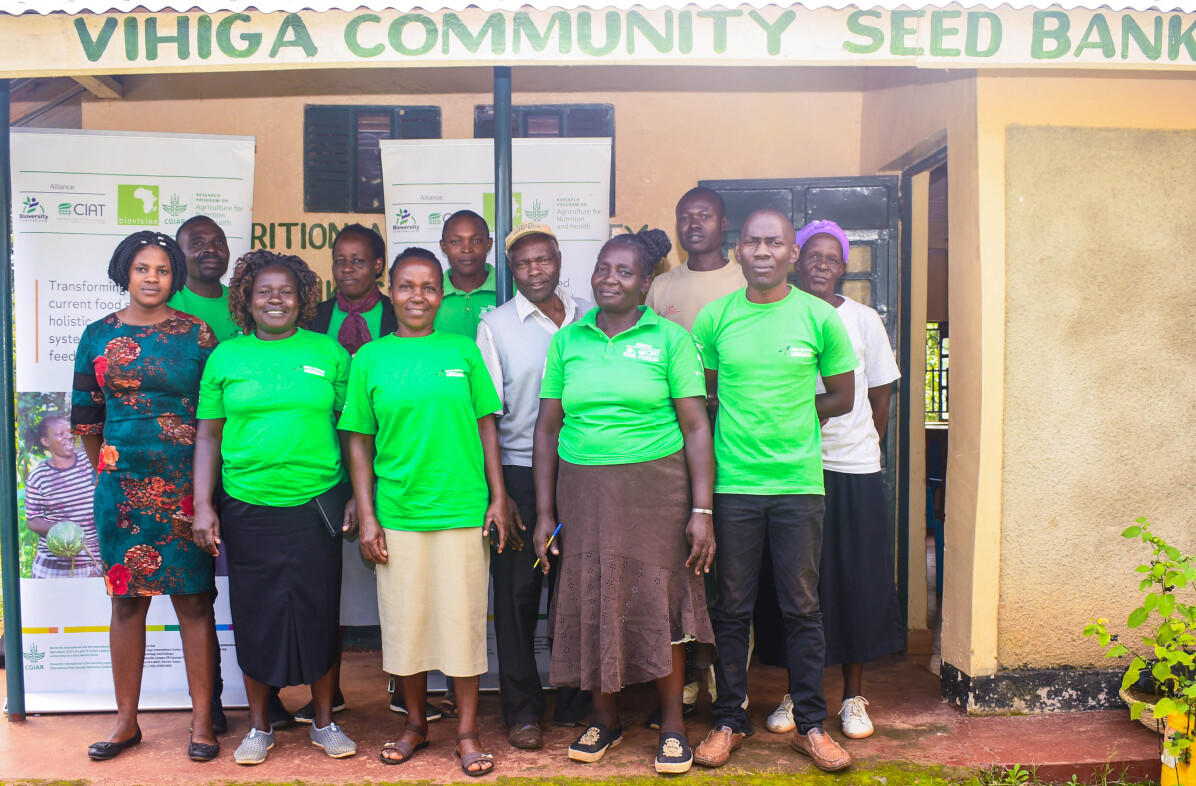
Farmers at the Vihiga Community Seed Bank. Credit: Owen Kimani
Farmer-driven crowdsourcing and participatory variety selection
To further promote community-led conservation and use of a wealth of diverse seeds to support on-farm diversity, production of year-round diverse foods, incomes and dietary quality, the project has supported introduction of other crops to the CSB including beans, sorghum, millet and fruit trees. Through crowdsourcing exercises, farmers have been testing and selecting various varieties of beans, sorghum and millet based on performance, yield, preference, among other characteristics. Additionally, participatory evaluation of these crop varieties has been ongoing at various demonstration sites across the county which has positively influenced farmers’ uptake of these crops/varieties for diversification on their farms.
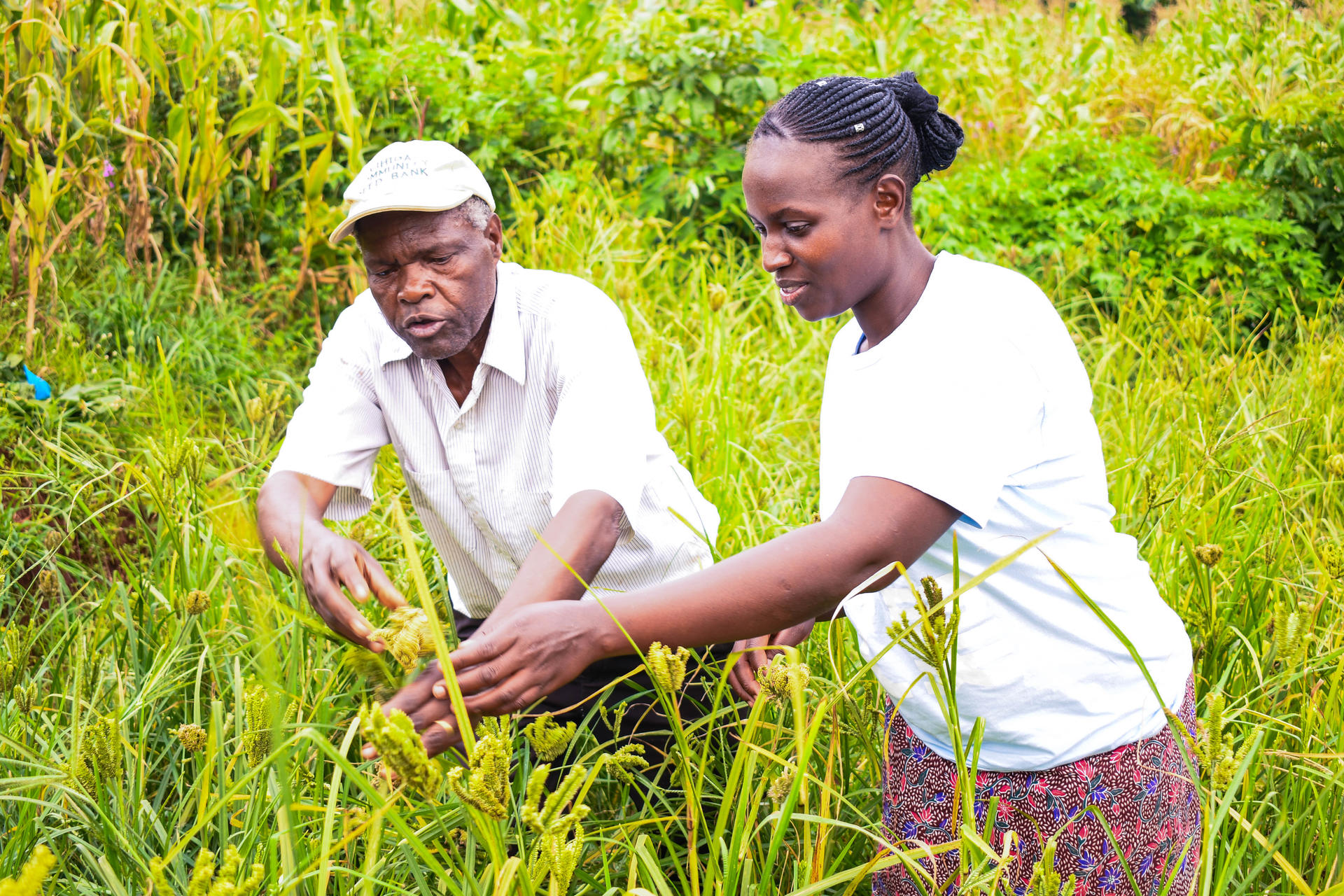
A demo plot where participatory variety selection of millet is ongoing: farmers are also testing different varieties on their own farms. Credit: Owen Kimani
Vihiga Agroecology Policy
Through the project, the Alliance is collaborating closely with the County Government of Vihiga and other partners to develop an Agroecology policy. The policy seeks to promote the adoption of agroecological practices to enhance agrobiodiversity conservation for a more sustainable food system. Currently, a zero draft of the policy is finalized and ready to go through public participation.
Project milestones:
-
Farm Resilience through Diversity
The project works to ensure farm resilience through diversity hence enhancing farmers’ capacity to adapt to and recover from various challenges including climate fluctuations, pest and disease outbreaks, and market shifts. Diverse seeds are at the heart of building this resilience in the community. The community groups have stayed away from monoculture and adopted diverse seeds involving planting a variety of plant species and genetic traits. This diversity provides a natural defense against potential threats.
With diverse seeds, the farmers have been able to identify crop varieties that are better suited to local environmental conditions and changing climate patterns. In times of extreme weather events or diseases affecting a specific crop, others in the field can fill the void, ensuring a more stable food production system. Additionally, by fostering biodiversity on farms, diverse seeds have created habitats for beneficial insects and wildlife, reducing the reliance on chemical inputs for pest control. Consolata Lumati, a beneficiary narrates how she has been employing traditional methods to control pests including the use of ash, brick powder, neem powder among others;
“These methods are cheap and affordable, the materials are locally available and not damaging to the environment; they also have a long-lasting effect on the seeds being preserved.”
-
Diverse seeds for food security
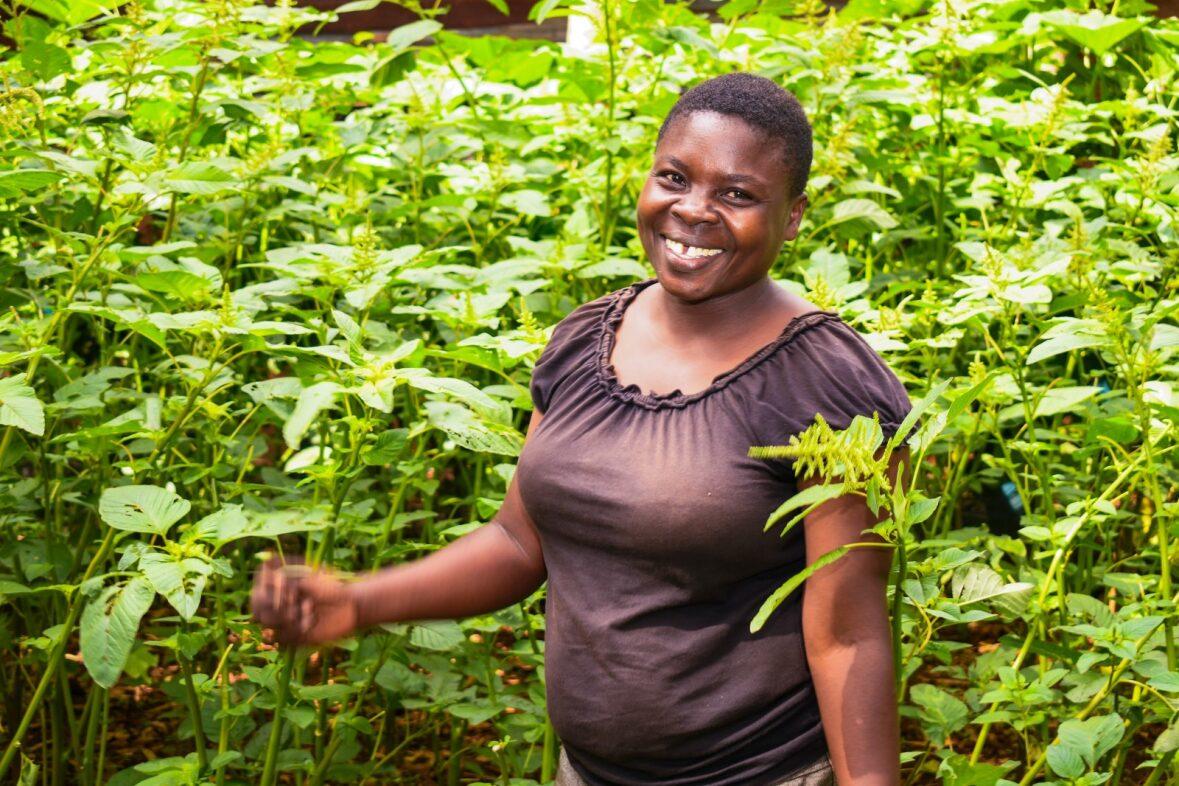
The basket is leafy as demonstrated by Valery on her farm. Credit: Owen Kimani
In today's world, food security is a critical global issue, especially as the population continues to grow. Diverse seeds in the Vihiga region play a vital role in enhancing food security by reducing the risks associated with relying on a single crop. Monoculture exposes farmers to the danger of crop failure due to pests, diseases, or unfavorable and unpredictable weather conditions which have been a challenge in the region.
By cultivating a diverse range of leafy green vegetables, farmers in the project have created a safety net, ensuring a continuous supply of vegetables hence reduced household expenditure on food.. Besides, they sell the surplus and buy other nutritious foods including animal source protein like fish. Furthermore, diverse seeds have enabled farmers to grow crops with varying growth cycles, allowing for staggered planting and harvesting. This approach alleviates the burden on resources during peak agricultural seasons, promoting a more sustainable food system for the farmers. Evans Ochuto, the chairman of the CBO talks about his challenges and solutions,
“I am a young farmer, I was a mason in Nairobi for quite some time but I got a health issue and came back home, I wanted to be creative and Alliance’s entry to the region was timely, I was able to challenge myself, I wanted to see my young family grow in a healthy way. The vegetables have been of great help. Initially, I faced the challenge of land ownership, but I was able to change this around by leasing land, this is a practice that has helped a lot of us expand our production and even advance to the markets. Land leasing is an affordable alternative to all those who are facing the challenge of lack of land.”
-
Nurturing Healthier Diets
Research and common knowledge over the years has shown a healthy diet is essential for overall well-being and disease prevention. Unfortunately, modern food systems often prioritize a limited set of crops that are high in calories but lacking in essential nutrients. This has led to an increase in diet-related health issues, such as obesity, diabetes, and malnutrition.
But with our farmers here, a lot of capacity building has gone into showing the importance of diverse seeds which offer a plethora of nutrient-rich options that contribute to healthier diets. According to the County’s nutritionist, Esther Odera,
“The traditional leafy vegetables with unique nutritional profiles have helped combat micronutrient deficiencies and promote nutrition in this region. Initially, our main focus was pregnant mothers and children under five, it is amazing to see the positive trends in the four sub-counties where the project is being implemented.”
She encourages all of us to incorporate diverse seeds including traditional leafy vegetables for healthy diets, rich in a broader spectrum of vitamins, minerals, and antioxidants, supporting our immune systems and overall health.
-
Reviving Local Food Systems
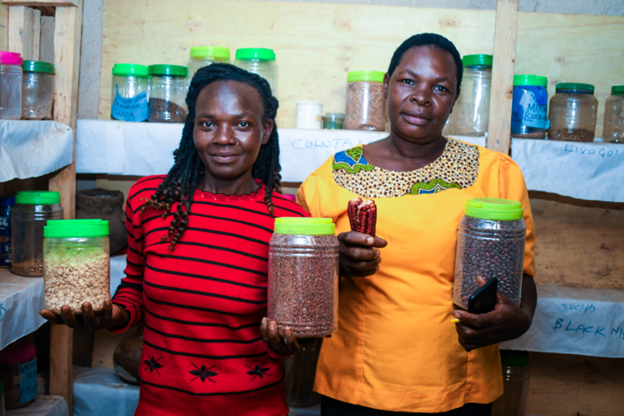
A smaller seed bank in a homestead. Credit: Owen Kimani
The widespread adoption of monoculture and reliance on commercial seeds have led to the decline of traditional and indigenous crops. But for the Vihiga sub counties, embracing diverse seeds has led to revitalizing the local food system and preserving cultural heritage. Therefore, they have a community seed bank. They use the seed bank to conserve, document and exchange different seed varieties, as well as restore the threatened and lost species/varieties of crops from the region and far wide. This practice has also been adopted at sublocation level where farmers have set up their own mini seedbanks with support from the Alliance. Indigenous and heirloom varieties of seeds hold immense value not just for their nutritional benefits but also for their role in connecting communities to their agricultural roots.
Local seed saving and sharing practices in the region have empowered farmers with the knowledge and skills to be self-sufficient in seed production, reducing dependence on external seed suppliers. This, according to Lilian Aluso the project coordinator, has fostered food sovereignty, allowing the community to have control over their food production and consumption, while also supporting small-scale farmers and local economies.
Conclusion
Diverse seeds are fundamental to building farm resilience, ensuring food security, and promoting healthier diets. By embracing agricultural practices that prioritize diversity, The Alliance through the Biovision Foundation Switzerland funded project “Diverse seeds and planting materials supporting farm resilience, inclusive value chains and healthy diets in a sustainable Vihiga County food system” has contributed towards a more robust and sustainable food system. Moreover, the community in Vihiga confirms that diverse seeds have offered a cornucopia of flavors and nutritional benefits, enriching their diets and enhancing their well-being.
As consumers, we can support diverse seeds by choosing locally sourced and heirloom produce, advocating for biodiversity in agriculture, and encouraging sustainable farming practices. Together, we can contribute to a more resilient, nutritious, and sustainable food future for generations to come.


